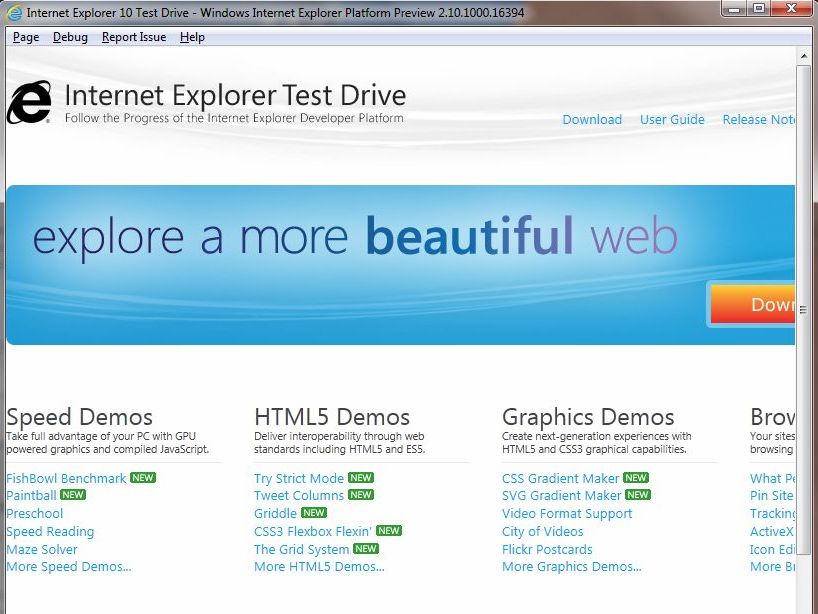Move to web apps reignites browser wars
Browser development speeds up - IE10 already shown off

Sign up for breaking news, reviews, opinion, top tech deals, and more.
You are now subscribed
Your newsletter sign-up was successful
Remember the browser wars of the late 1990s? They're back, and they're bigger and badder than ever.
You could turn it into a film, in fact: Microsoft takes on the plucky Netscape and kills it to death, but Netscape's son Mozilla vows that one day, he will get his revenge - so he bides his time, recruits an army that includes the famous warriors Google, Opera and Apple, gets tooled up and challenges Microsoft to a rematch.
Well, it's a bit like that, anyway - and this time, it's all about apps.
At this week's Mix conference in Las Vegas, Microsoft unveiled a preview of IE10 - and it did so with some controversial claims. Apparently IE9 delivers "the most native HTML5 experience and the best web experience on Windows", a claim that's caused Opera's Haavard Moen to respond: "HTML5 is not native. It is not supposed to be native".
Marketing claims aside, browser development is speeding up. It seems as if Google's updated Chrome every time we open it, and Firefox has moved to a speedier development cycle in order to compete. And of course the paint was barely dry on IE9 when Microsoft started talking about IE10.
Faster release cycles
Microsoft may be taking potshots at Chrome over its constant stream of updates - faster releases "just means bigger version numbers and more updates of incomplete standards," Microsoft's Dean Hachamovitch told Mix delegates - but Microsoft's speedier release plans show that it's taking Chrome very seriously.
Sign up for breaking news, reviews, opinion, top tech deals, and more.
As TechRadar writer Mary Branscombe points out, IE10 is part of a bigger picture. "IE10 is trying, like IE9, to straddle the two worlds of open, ever-evolving web standards and the power in Windows that makes you want to use the operating system." As the IE10 platform preview demonstrates, it's all about apps.
The original browser wars occurred because Netscape had a vision: the web would make traditional operating systems obsolete.
That scared Microsoft silly in the 1990s, but it's embracing the idea now. Microsoft is positioning IE - and by extension, Windows 8 - as the best platform for running web apps, and it's doing so partly because Google's Chrome OS - a browser that's also an operating system - is on the horizon.
On the face of it, pushing any platform as "best for web apps" seems silly: the kerfuffle over "native HTML5" is because HTML is supposed to be device and platform independent: it should deliver the same experience no matter what you access it on.
Different approaches
In reality, though, there are differences between the browsers: different levels of standards support, different levels of performance, different approaches to security, and different levels of operating system integration - so for example IE9's (and 10's) integration with the Windows Taskbar means that web apps can seem more Windows-like, and IE's hardware acceleration can make a big difference to application performance on suitable hardware.
The more software moves from the desktop to the browser, the more crucial such differentiation will become.
In an increasingly app-y world, getting us to think "Windows" when we see web apps is essential for Microsoft. Unlike Google, which doesn't really care how we get online as long as we're seeing and clicking Google ads when we do, Microsoft has a software business to protect.
If web apps look the same, act the same and perform the same on any platform, who needs Windows?
The worry for some is that IE may once again be EEE - that is, "embrace, extend and extinguish", Microsoft's famous strategy for clobbering the competition.
We've been here before: Microsoft embraced the idea of the browser, extended it and then extinguished Netscape, and it promptly shuttered browser development for the best part of a decade. Microsoft's rivals are keen to stop that particular bit of history from repeating.
--------------------------------------------------------------------------------------------------

Contributor
Writer, broadcaster, musician and kitchen gadget obsessive Carrie Marshall has been writing about tech since 1998, contributing sage advice and odd opinions to all kinds of magazines and websites as well as writing more than twenty books. Her latest, a love letter to music titled Small Town Joy, is on sale now. She is the singer in spectacularly obscure Glaswegian rock band Unquiet Mind.